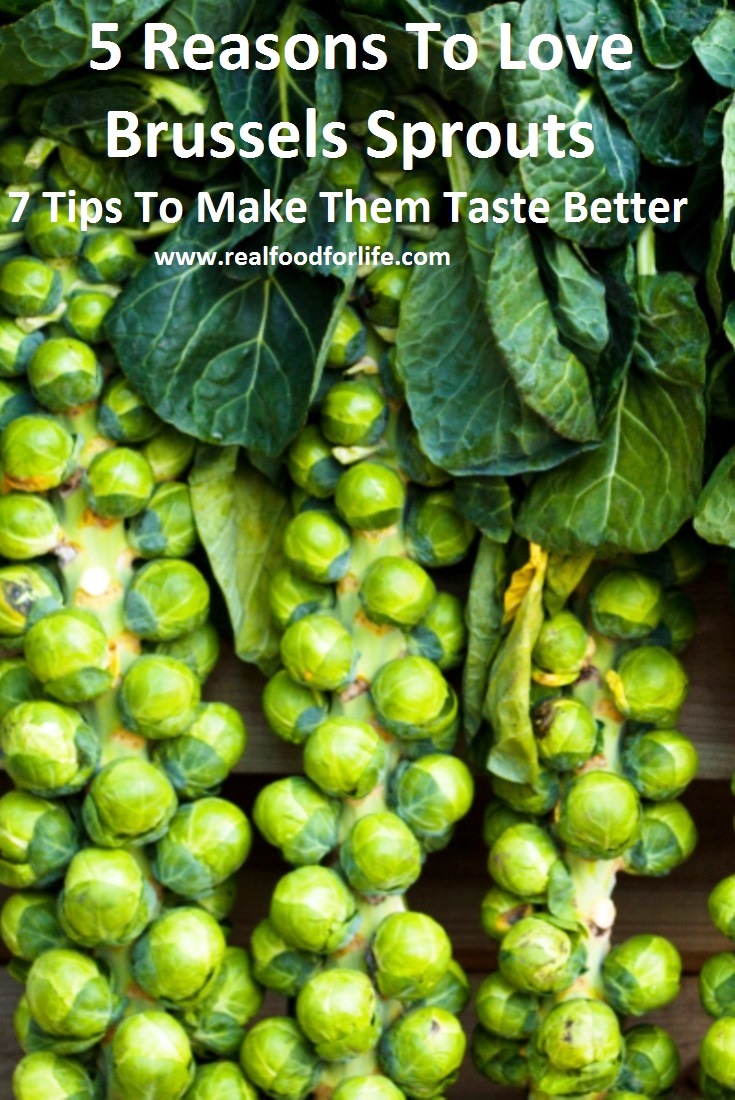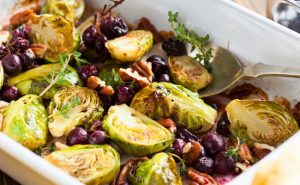If you’ve already decided you don’t like Brussels sprouts, it’s probably because at some point in your life someone served you somewhere their tasty, nutty, sweet flavor was boiled away. When you learn how to cook them properly, you may find them totally yummy!
They look like mini cabbages and are in fact in the same family.
There are many good reasons to eat this vegetable as it is full of health benefits.

5 Health Benefits of Brussels Sprouts
1. Keeps Bones Strong and Healthy
They are full of vitamin K, which is responsible for good bone health. One cup of the sprouts has over 270 percent of your daily vitamin K requirement. Studies have found vitamin K to be helpful in increasing bone density and reducing fractures in osteoporosis patients.
2. Helps Fight Cancer
The research for how Brussels sprouts helps fight cancer is vast. Here are a few highlights.
- They are a cruciferous vegetable, which have been shown to lower overall cancer risk according to research at Oregon State University.
- It was found that people who ate greater amounts of them had a lower risk of cancer, as stated at the National Cancer Institute fact page.
- Cruciferous vegetables have been found to help inhibit and regulate cancer-causing genes. Cruciferous vegetables are “key to eliminating cancer” according to research at the University of Alabama at Birmingham.
- Also, this vegetable is a glucosinolate-containing cruciferous vegetable, which a 1995 study found reduces colon cancer.
3. Lowers Cholesterol
When they are steamed, the fiber components bind with intestinal bile acids, helping them to pass out of the body. This creates a need in the body to replenish lost bile acids, using the existing supply of cholesterol, thus reducing it. Uncooked ones do have some ability to lower cholesterol, but it’s low compared to the process of steaming, according to the Western Regional Research Center.
4. Provides A Good Source of Protein When Combined with a Whole Grain
They contain a good quantity of protein. There are 4 grams of protein in one cup of the sprouts. You will get the most protein when you eat them with a whole grain as they need the balance of other amino acids.
5. Promotes Weight loss
One cup of this vegetable has only 56 calories. They are low in fat and have 4 grams of fiber. This fiber has many benefits for your digestive system and gives you that ‘full’ feeling. They are nutrient-dense so your body is also satisfied long term.
If you’re taking blood-thinners, it’s important to monitor the foods you eat containing vitamin K, including Brussels sprouts. Vitamin K aids in blood clotting.
Cruciferous vegetables which include Brussels sprouts, cabbage, broccoli, cauliflower, kale, bok choy, turnips, arugula and watercress have been found to cause hypothyroidism. In a study, it was found that eating 7 – 8 cooked Brussels sprouts for four weeks had no effect on thyroid function, but more research is needed.

Nutrition
One serving of Brussels sprouts will meet your needs for vitamin C and vitamin K for the day. They are one of the top 20 most nutritious foods as scored by the Aggregate Nutrient Density Index.
One cup of cooked Brussels sprouts provides:
56 calories
274 percent vitamin K
162 percent vitamin C
24 percent vitamin A
24 percent folate
18 percent manganese
14 percent potassium
14 percent vitamin B6
12 percent thiamine vitamin B1
10 percent iron
4 grams protein
4 grams fiber
270 mg of omega-3 fatty acids
They also contribute to your daily need for calcium, providing 37 milligrams in one cup.
Trivia
- They are spelled Brussels sprouts, NOT Brussel sprouts and NOT brussel sprouts.
- A team of scientists with local schoolchildren lit a Christmas tree in London, England from the energy of 1,000 Brussels sprouts!
- They are used in Chinese medicine to improve digestion.
- Brussels sprouts are the most hated vegetable in Britain and America!
History
- The name Brussels sprouts comes from Brussels, Belgium where they were first grown in quantity in the sixteenth century.
- They are said to have been developed from wild cabbages in the Middle East.
“Brussels sprouts are misunderstood – probably because
most people don’t know how to cook them properly.” – Todd English
How To Make Brussels Sprouts Taste Yummy
To get the tastiness and optimum nutrition from Brussels sprouts, here are some very helpful tips.
How to Select The Best
- Look for sprouts that are still on the stalk for freshness and are smaller in size as they tend to be sweeter, tenderer and have a less fibrous taste than larger sprouts.
- The leaves are tight and firm; when the leaves are loose it means they are older sprouts.
- The fresher the Brussels sprouts, the tastier they will be.
How to Store
Store the sprouts in a bag in the refrigerator for 2-6 months at 32 degrees Fahrenheit. Do not store the sprouts with apples, pears, avocados or other ethylene producing foods as bitter flavors will develop.

7 Tips for Making Tasty Brussels Sprouts
1. First, cut off the ends as that is where most of the bitterness is.
2. Next, cut them in half. This will help some of their bitterness to leach out during cooking.
3. For the tastiest sprouts, it’s important not to overcook them; this adds a bitter flavor and diminishes their nutrition.
4. Roasting them helps bring out their best flavor by taking away the sulfur odor and taste, making them yummy, as well as keeping their bright green color.
5. To get the benefits of the very high vitamin K content, it’s best to eat Brussels sprouts with a source of healthy fat. This is because vitamin K is a fat-soluble vitamin and gets absorbed in the intestines when included with other fats. Therefore, add an olive oil dressing or roast them in coconut oil or ghee.
6. They taste better after they have been exposed to a few touches of frost. The frost causes the sugars to become more concentrated in the Brussels sprouts.
7. Putting them in the freezer for an hour before cooking is said to help, as it will give them the frost benefit without freezing them outdoors.
Two Tasty Brussels Sprouts Recipes for You

Roasted Brussels Sprouts with Pecans and Cranberries – This roasted Brussels sprouts dish is exceptionally tasty, fit for a celebration meal. Roasting the Brussel sprouts till crisp takes away the sulfur odor and taste. Adding the cranberries and pecans takes it to a whole other level for a special meal.
Brussels Sprout Salad – This is a very easy salad to make and highly nutritious.
100+ Superfoods
Learn more about some of the healthiest vegetarian foods you will always want to have in your pantry or growing on your deck.
READ: Superfoods – Over 100 of the Healthiest Foods You Should Have in Your Diet and learn more about the variety of Superfoods we think you should have in your diet.


Great article – thank you! Now I have to make a point to add more Brussels Sprouts to our meals. I usually roast them in olive oil, salt and pepper and my kids love them that way.
this was wonderful! Thank you for sharing all these tips and recipes..really helps those of us without the create gene;)